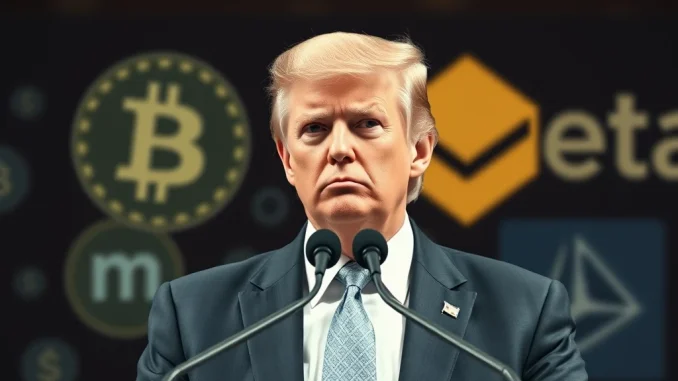
The landscape of digital finance is constantly evolving, and with it, the scrutiny from regulators. A major point of contention currently swirling within US political circles concerns stablecoin regulation, specifically who should and shouldn’t be allowed to issue these increasingly popular digital assets. At the forefront of this debate is a prominent voice known for her critical stance on cryptocurrencies: US Senator Elizabeth Warren.
Why is Elizabeth Warren Concerned About Big Tech Stablecoins?
Senator Elizabeth Warren has been vocal about the potential risks posed by the rapid growth of the crypto market, and her attention has now sharply focused on the intersection of big tech stablecoins and financial stability. Her core argument centers on the immense power and reach already wielded by large technology corporations.
According to Senator Warren, allowing companies like Meta (formerly Facebook, which previously pursued the Diem stablecoin project) to issue their own stablecoins could concentrate excessive financial power in the hands of a few private entities. This, she argues, could:
- Give Big Tech unprecedented access to sensitive financial data from billions of users.
- Allow them to potentially stifle competition by favoring their own payment systems within their vast ecosystems.
- Create systemic risk if a major tech company’s stablecoin were to fail or face a run.
- Enable them to potentially block or restrict access to the payments system for small businesses or political adversaries, consolidating economic and political control.
Her recent statements underline a deep-seated concern that the financial system could become beholden to the commercial interests of tech giants rather than serving the broader public good.
The Push for Specific US Stablecoin Law
Senator Warren isn’t just voicing concerns; she’s actively calling for legislative action. She asserts that existing or proposed legislation, specifically mentioning the GENIUS Act (Gender Equity in Native Indian Organizations) which seems like a potential typo in the source or refers to a different bill contextually relevant to Senate discussions, must be amended to explicitly prohibit large tech companies from issuing stablecoins. This suggests a move towards creating specific US stablecoin law that draws clear lines around participation, particularly for entities with significant market power outside of traditional finance.
Her call is for a definitive ban, not just regulation. This distinction is crucial. Regulation might involve rules around reserves, transparency, and compliance. A ban, however, would prevent these companies from entering the stablecoin market altogether, either directly issuing them, owning a stablecoin company, or being affiliated with an issuer.
What Does This Mean for Crypto Policy US?
Senator Warren’s stance is a significant indicator of the direction some policymakers wish to take regarding crypto policy US. It highlights a growing divide:
- Those who see crypto and stablecoins as financial innovation that needs careful regulation to mitigate risks while fostering growth.
- Those who view certain aspects of crypto, especially when integrated with powerful existing entities like Big Tech, as posing fundamental threats that require outright prohibition.
This debate is far from settled. While some in Congress are working on frameworks to integrate stablecoins into the existing financial system under regulatory oversight, others, like Senator Warren, advocate for stricter gatekeeping, particularly concerning non-financial corporations.
The outcome of these discussions will have profound implications for the development and adoption of stablecoins in the United States, influencing everything from payment systems to decentralized finance (DeFi).
The Broader Debate: Innovation vs. Control
The discussion around big tech stablecoins isn’t just about the technology; it’s about control and power. Proponents of allowing tech companies into the space argue they could bring efficiency, speed, and lower costs to payments on a global scale, leveraging their existing user bases and infrastructure. They might argue that competition, even from large players, is ultimately beneficial.
However, opponents like Senator Warren emphasize the potential for unchecked power, data monopolies, and the risk of a private entity gaining too much leverage over public financial infrastructure. Her quoted statement to CoinDesk, “No Senator should vote to make it easier for Big Tech to pry into our financial transactions or choke off small businesses and political adversaries from the payments system,” encapsulates this fear of concentrated, potentially weaponized financial power.
The legislative path forward is complex, involving balancing the potential benefits of innovation with the imperative to protect consumers, maintain financial stability, and prevent anti-competitive practices.
In Conclusion: A Critical Juncture for Stablecoins
Senator Elizabeth Warren’s forceful call to ban big tech companies from the stablecoin market marks a critical point in the ongoing debate over stablecoin regulation in the United States. Her concerns about privacy, market dominance, and potential misuse of financial power by tech giants resonate with those wary of concentrated corporate influence.
As Congress continues to deliberate on potential US stablecoin law, the tension between fostering innovation and implementing stringent controls remains at the forefront. The decisions made regarding crypto policy US in the coming months and years will shape the future of digital currencies and their role within the global financial ecosystem, determining whether powerful tech entities will be participants or remain on the sidelines.
This is a developing story, and the outcome will significantly impact not only big tech stablecoins ambitions but also the broader trajectory of cryptocurrency adoption and regulation worldwide.



